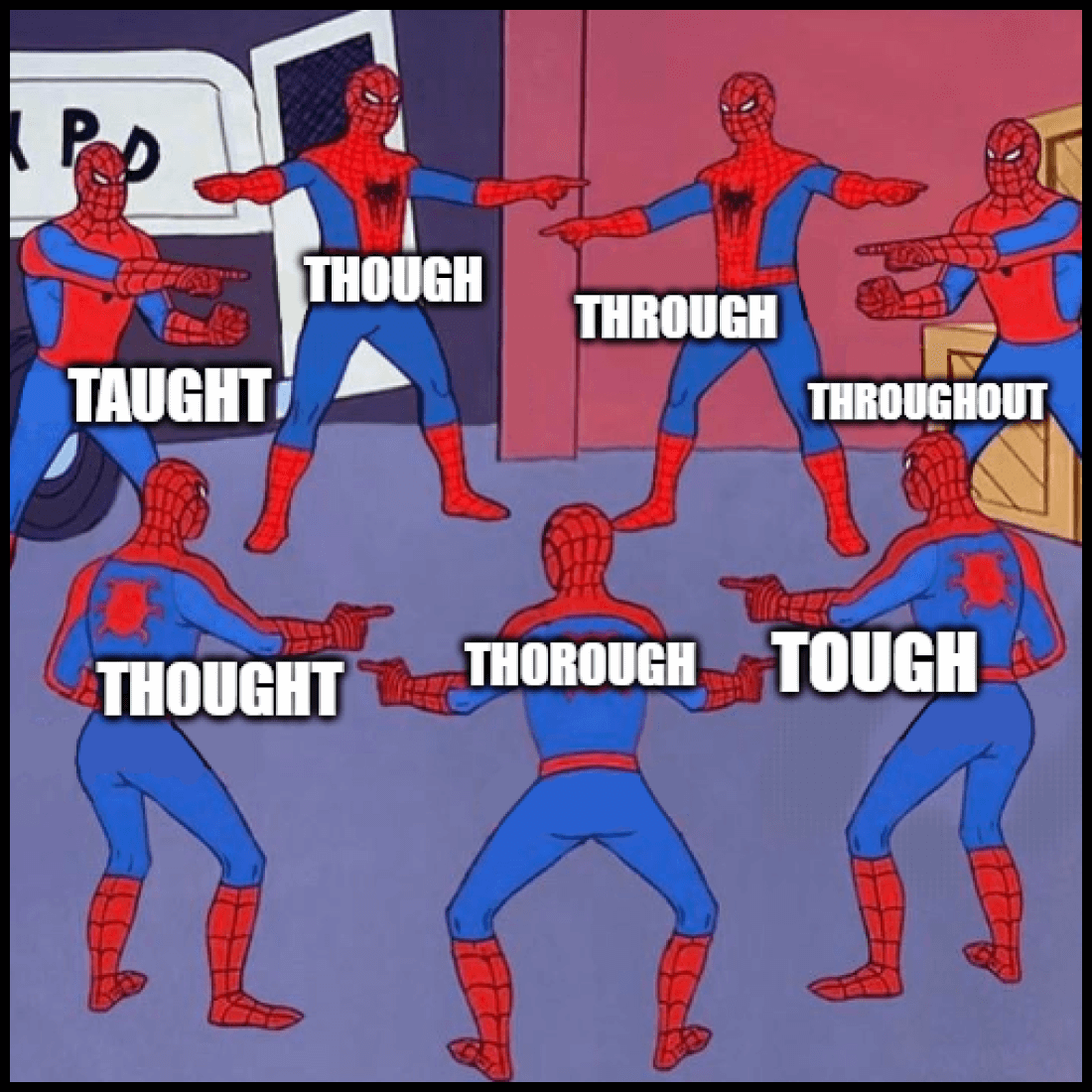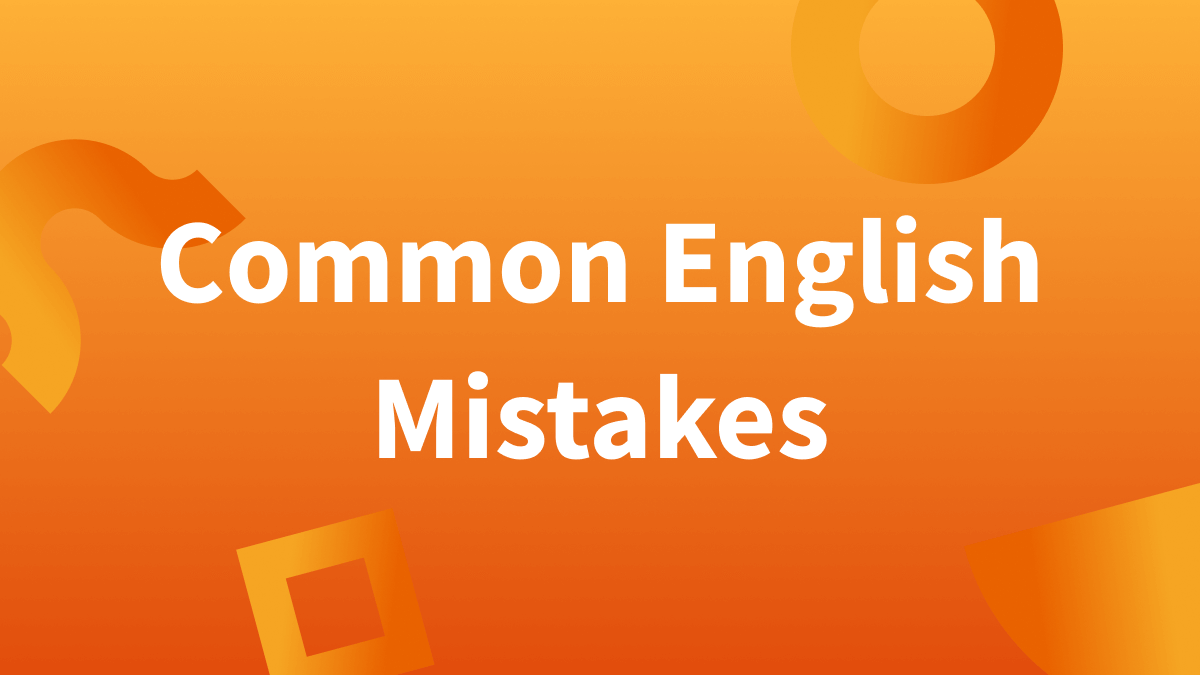What Are Common Mistakes in English?
A few of the most common mistakes in English are:
English Grammar (and Spelling) Can Be Tricky
Have you ever sent an important email only to realize after that there was a spelling, grammar, or punctuation mistake in it? It’s a gut-wrenching feeling many of us—native speakers and English learners alike—have endured.
Sometimes the error is a result of a typo, and other times they’re made because you simply aren’t aware of the mistake. And we don’t blame you. English is full of nuanced grammar rules, homophones, and things like silent letters that make it challenging to get right 100% of the time.
What’s the best way to avoid making common errors in English? Simply knowing they exist. Below, you’ll find eleven of the most common mistakes in English and how to correct them.

Common English Mistakes
1. Their vs. There vs. They’re
There refers to a place. This word has here in it, which can help you remember that it’s referring to a place.
Can you go over there, please?
Their is the possessive form of they, meaning “belonging to them.” If you’re unsure whether you’re using this word correctly, replace it with his or her, and if it makes sense, you’ve got it right!
I think someone forgot their bag.
I think someone forgot his or her bag.
They’re is the contracted form of they are. You can always replace the word in question with they are, and if the sentence makes sense, then you’re using the right word of this tricky trio.
They’re my best friends.
They are my best friends.
2. Your vs. You’re
Your is a possessive adjective; you’re is a contraction of you are.
Your outfit is fantastic!
You’re going to do great.
If ever in doubt, just replace the word you’re unsure about with you are. If the sentence is still grammatically correct, then you’re is the option you’re looking for.
3. Many vs. Much
Use many with countable and plural nouns, and much with uncountable and singular nouns.
There are many ways to solve a problem.
I gave the plant far too much water.
4. Than vs. Then
Than is used for comparison, whereas then is mostly used when referencing time.
She is younger than I am.
We went to dinner, then we went and got ice cream.
An easy way to remember when to use these words is that than is used for comparisons (both have “a’s”) and then is used with time (both have “e’s”).
5. Affect vs. Effect
Most of the time, affect is used as a verb that means “to cause a change to someone or something.”
I didn’t want the review to affect her performance, so I hid it from her.
Effect, on the other hand, is mostly used as a noun that means “a result of an action or other cause.”
Eating whole foods had a positive effect on my mental health.
Remember: affect is usually a verb and effect is usually a noun.
6. Less vs. Fewer
Like many vs. much, use less when referring to singular nouns and fewer when referring to a plural noun.
There’s less food than I expected.
There are fewer pies than I thought there would be.
7. It’s vs. Its
It’s is a contraction that stands for it is or it has.
It’s going to rain later today. = It is going to rain later today.
It’s been a long day. = It has been a long day.
Its, on the other hand, can function as a pronoun or as an adjective that indicates possession.
The dog brought back its toy.
8. Who’s vs. Whose
Who’s is a shortened form of who is and who has.
Who’s going to join us? = Who is going to join us?
Who’s read the book? = Who has read the book?
Whose is a possessive form of “who.”
Whose bag is this?
9. If I Was vs. If I Were
Many people use if I was and if I were interchangeably in casual speech. But if you’re writing in a formal setting, you should know the difference.
Use if I was when referring to something that has already happened.
If I was grumpy earlier, it’s only because I was hungry.
If I were is used in the subjunctive mood, which is reserved for hypothetical, imaginary, or contrary-to-the-fact situations.
If I were rich, I’d buy my mom a house.
10. Everyday vs. Every Day
Everyday is an adjective that means “used daily,” or “ordinary.”
It was an everyday occurrence.
Every day is a two-word adverb phrase that means “daily.”
We practice every day.
11. To vs. Too
To is mostly used as a preposition that means “in a direction towards.” You can remember this because to is in the word towards.
Let’s go to the mall.
Too can mean “in addition to,” “as well,” “extremely,” or “very.”
I’m scared too.
I’m too good at this.
If you’re using too to mean “in addition to,” just remember that it has an additional “o.”
It’s worth mentioning that two refers to the cardinal number (2), although most people don’t get that one confused.
LanguageTool Can Help You With All These and More
These are just but a few of the common English mistakes many people make. There are numerous topics people have trouble with. Sure, you can try to remember each and every one individually. Or, you can use LanguageTool as your spelling and grammar checker. This advanced writing assistant will remember all these common mistakes and then some, leaving your writing flawless.

